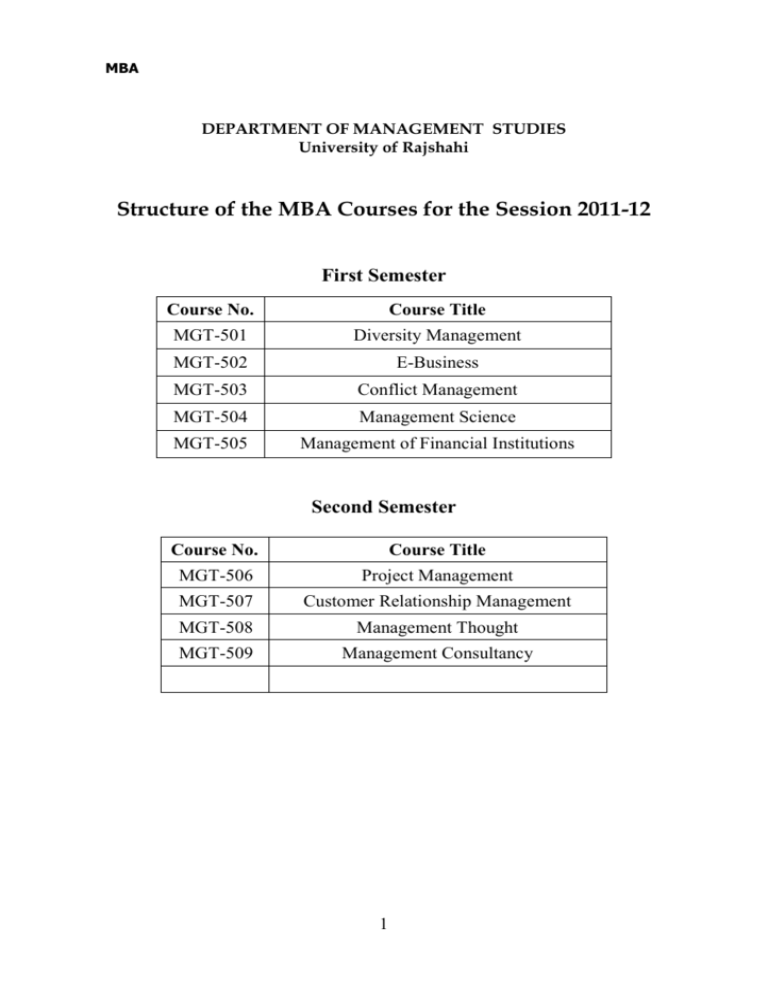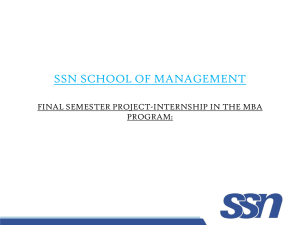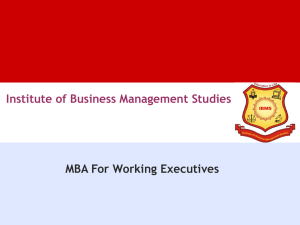Management Department
advertisement

MBA DEPARTMENT OF MANAGEMENT STUDIES University of Rajshahi Structure of the MBA Courses for the Session 2011-12 First Semester Course No. Course Title MGT-501 Diversity Management MGT-502 E-Business MGT-503 Conflict Management MGT-504 Management Science MGT-505 Management of Financial Institutions Second Semester Course No. Course Title MGT-506 Project Management MGT-507 Customer Relationship Management MGT-508 Management Thought MGT-509 Management Consultancy 1 MBA Contents Page 1. Introduction : i 2. Structure of MBA Courses : ii 1st Semester : 2 2nd Semester : 6 4. Ordinance for MBA Program : 11 5. Name of the faculty and Staff : 18 3. Detailed Syllabus 2 MBA DETAILED SYLLABUS OF MASTER OF BUSINESS ADMINISTRATION One academic session required to complete the program. The academic session consist of two semesters. Each semester has duration of 19 weeks. Five courses are offered in a semester. Each course will carry 50 marks. Grading is based on a full of 100 numerical marks per course. Of the full marks there shall be 80 percent marks for written examination at semester final and 20 percent marks for in course tests, home assignments and oral tests. A three hours written examination will be held for each course at the end of each semester. Additionally the students have to appear internship near the end of 2nd semester and a viva-voce examination carrying 50 marks (3 credit hours) at the completion of 2nd semester in the academic session. The results shall be published in grade earned and grade point average (GPA) at semester and/or session end. 3 MBA FIRST SEMESTER MGT-501: DIVERSITY MANAGEMENT 1. Evolution of diversity concept: Theories of diversity management. 2. Diversity at workplace: Ethnicity-Gender-Age-Physical disabilitySexual orientation-Experience and educational background. 3. Mapping and managing diversity at workplace. 4. The process of institutionalizing diversity. 5. Diversity vs. profitability and employee satisfaction. 6. Globalization and diversity management. Books Recommended: 1. Taylor Cox & Ruby L. Beale 2. Pushkala Prasad; Albert J. Mills; Michael Elmes; Anshuman Prasad 3. Michàlle Mor Barak : Developing Competency to Manage Diversity: Readings, Cases & Activities : Managing the Organizational Melting Pot: Dilemmas of Workplace Diversity : Managing Diversity: Toward a Globally Inclusive Workplace : Handbook of Workplace Diversity 4. Alison M. Konrad, Pushkala Prasad, Judith K Pringle (Further references may be given by the course teacher) MGT-502: E-BUSINESS 1. 2. 3. 4. 5. Introduction: Definition-Importance-E-commerce and small business-Root of electronic commerce. Internet infrastructure: World Wide Web-Internet works- Global impact of the Internet service provider- Internet payment mechanism. E-Business: Business-to-Consumer (B2C)-Business-to-Business (B2B) commerce-Virtual organization. E-Purchasing: Four approaches to e-purchasing-Green purchasingSupplier relation-Electronic commerce marketing. Critical success factors for electronic commerce-Applicability of electronic commerce-The business sectors in Bangladesh. 4 MBA Books Recommended: 1. Huff S.L. Schneberger; Case in Electronic Commerce W.M. Newson and P. Parent 2. Lee J. Krajewski and Operations Management: Strategy and Larry P. Ritzman Analysis 3. M. Greentein and T. Electronic Commerce: Security Risk Feinman Management and Control 4. The Emerging Digital Economy II, 1999 (Students are to browse on internet for updated news, Website is available at http://www.commerce.gov/edu) (Further references may be given by the course teacher) MGT- 503: CONFLICT MANAGEMENT 1. Measurement of conflict-Conflict management design-Intrapersonal and interpersonal conflict-Intragroup and intergroup conflicts. 2. Disciplinary action: Basic elements of the disciplinary action process-Disciplinary penalties-Quads to disciplinary action. 3. Organizational conflict: Nature of conflict-Pattern conflict-Sources of conflict-Reasons for conflict in organization and effects of conflicts. 4. Managing conflict: Facts of conflict-Competitive and cooperative conflict-Conflict triggers-Resolving and eliminating conflictManaging conflict in organization. 5. Conflict resolution process: Diagnostic model of interpersonal conflict-Strategic ingredients supporting productive dialogueTechniques for managing a dialogue-Third party attributes. Books Recommended: 1. Afzal A. Rahman Managing Conflict in Organization 2. Lewicki Essentials of Negotiation 3. R. Kreitner Management (Further references may be given by the course teacher) MGT-504: MANAGEMENT SCIENCE 1. Management science: Definition-Characteristics-The tools of management science-The management science process-Managerial problems-Managerial decision making. 5 MBA 2. Linear programming I: Meaning of linear programming-Fields where LP can be used-Basic concepts-Graphic solution-Simplex solution-Degeneracy-Non-feasible solution-Unbounded solutionLimitations of linear programming. 3. Linear programming II: Transportation problems-Transportation method (Applying North West corner rule)-Unbalance transportation problems. 4. Queuing theory: Meaning of queue-Terms commonly used in queuing theory-Object of the queuing theory-Elements of the queuing system-Simple queuing models-Limitations of QT. 5. Theory of games: Introduction-Illustration of games-Types of games-Value of the game-LP solution to Two-Person Zero-Sum games-Short cut method-Solution of 33-Limitations of the theory of games. 6. Inventory management: Meaning of inventory-Types of inventoryModels of inventory-Purchase model-Manufacturing modelEconomic order quantity-Material requirements planning-Concept and calculations-Manufacturing resource planning. Books Recommended: 1. E. Turban and J. R. Meredith 2. C. R. Kothari 3. 4. 5. 6. : Fundamentals of Management Science : An Introduction to Operational Research R. Panneerselvam : Production and Operations Management Richard I Levin; Charles : Quantitative Approaches to A. K. and David S. Rubin Management Richard I. Levin and : Statistics for Management David S. Rubin Sang M. Lee and Marc J. : Operations Management Schniederjans (Further references may be given by the course teacher) MGT-505: MANAGEMENT OF FINANCIAL INSTITUTIONS 1. Role of financial markets and institutions: Overview of financial markets-types of financial markets-Securities traded in the financial markets-Valuation of securities in the financial markets-Global financial markets-Role of financial institutions in financial markets6 MBA 2. 3. 4. 5. 6. 7. 8. Overview of financial institutions-Competition between and consolidation of financial institutions. Asset-Liability management techniques and hedging against interests rate and credit risk: Determining and measuring interest rates and controlling a bank’s interest sensitive gap-The concept of duration and managing a bank’s duration gap-Using financial futures and options in bank asset-Liability management-Using swaps and other asset-Liability management techniques. Determination of interest rates: Loanable funds theory-Economic forces that affect interest rates. Monetary theory and policy: Monetary theory-Pure Keynesian theory-Quantity theory and monetarist approach-Integrating monetary and fiscal policy-Global effect of monetary policy. Debt security markets: Money market securities-Bond marketsBond valuation and risk. Equity markets: Stock offering and investor monitoring-Stock valuation and risk. Derivative security markets: Financial futures markets-Options markets. Commercial banking: Commercial bank operations. Books Recommended: 1. Jeff Madura 2. Peter S. Rose 3. Peter S. Rose & Milton H. Marquis. : Financial Markets and Institutions : Commercial Bank Management : Money and Capital Markets: Financial Institutions and Instruments in a Global Market place (Further references may be given by the course teacher) 7 MBA SECOND SEMESTER MGT-506: PROJECT MANAGEMENT 1. Nature of project management-Definition-Features and types of project-Project life cycle-Elements and functions of project management-Project organization-Traditional management and project management-Qualities, functions and responsibilities of a project manager. 2. Project formulation and appraisal-Meaning of project formulation and appraisal-Steps in project formulation-Economic, social, financial, technical and managerial appraisal of project-Cost benefit analysis (SCBA -OECD) approach-UNIDO approach-Capital budgeting. 3. Planning and scheduling of projects-Steps in project planning and scheduling-Gantt chart-PERT-CPM time-Cost trade off-Planning at the national level. 4. Resource mobilization-Procedures for release of funds- Financing projects under ADP. 5. Project implementation-Steps in project implementationImpediments of project implementation-Guidelines to effective implementation. 6. Monitoring valuation and termination of projects-Techniques of monitoring-Precondition of effective monitoring-Methods of evaluation-Deferent status of project termination. 7. Project management in Bangladesh-Procedures of preparation and approval of development projects in Bangladesh-Organization and functions of planning commissions-ECNEC and IMED-Problems of project implementation in Bangladesh- An evaluation of JK project-JMP, and Modhopara Hard Rock Project. Books Recommended: 1. M. Serajudding 2. B.B. Goel 3. Jack R. Meredith; and Samuel J. Mantel Jr. 4. Sky lark Chandha 5. Prasanna : Project Management : Project Management : Project Management : Managing Project in Bangladesh : Projects Planning, Selection and Implementation (Further references may be given by the course teacher) 8 MBA MGT-507: CUSTOMER RELATIONSHIP MANAGEMENT 1. 2. 3. 4. 5. 6. 7. A Strategic Framework-Role-Needs-Types-Size and nature of CRM Markets-Five key cross-Functional process. Strategy development-Business strategy-Customer strategy-Market segmentation-Segment granularity-Aligning business strategy and customer strategy-Strategy matrix-Product based selling-Managed service and support-Customer based marketing-Individualized CRM-Migration paths. Value creation-Customer receives-Proposition assessmentOrganization receives-Customer acquisition and retentionCustomer segment lifetime. Multi-channel integration-Participants and options-Industry channel structures-Options and categories-Integration and categoriesstrategies-Customer experience-Building and planning strategy. Information management-Role-Process-Technical barriers-Data repository-Analytical tools-Task specific analysis tools-IT systemsFront office and back office applications-Emerging technology. Performance assessment-Need-Key drivers of ShareholderAppropriate standards matrices and Key performance indicatorsMonitoring system-Evaluating and communicating return on investment. Organizing for implementation-Readiness assessment-BarriersChange and project management-Employee engagement. Books Recommended: 1. Adrian Payne 2. Manfred Bruhn 3. Anderson, Kristin and Hand book of CRM Relationship Marketing of Customer Relationship Customer relationship Management Kerr, Carol (Further references may be given by the course teacher) 9 MBA MGT-508: MANAGEMENT THOUGHT 1. Origin and development of management-Industrial revolution and management-Management as a profession-Scientific method and management science. 2. Contribution of F W Taylor and Henri Fayol to management thought-Scientific management-General principles of management. 3. Contribution of behavioral scientists-Hawthorne experiment and Elton Mayo-Introduction to the works of Argyris McGregor and Likert. 4. Contribution of systems scientists-Business managers and public administrations-Models-Formal and informal organizations. 5. Different schools of management thought-Management theory Jungles-Problems of semantics. 6. Management in developing countries with special reference to Bangladesh in the light of the different schools of management thought-Effects of colonialism-Planned economic development and management-Socio-cultural influence-Management development institutions in Bangladesh. Books Recommended: 1. 2. 3. 4. 5. Claude S. George : History of Management Thoughts R.N. Singh : Management Thought and Thinkers Koontz and O’Donnell : Principles of Management Emest Date : Management: Theory and Practices Elistt Jaques The Changing Culture of a Factory (Further references may be given by the course teacher) MGT-509: MANAGEMENT CONSULTANCY 1. Introduction: Definition-Types and roles of consultants-Types of consulting firms-Effective consultant-Management consulting as a profession. 2. Consultant-Client relationship: Contents of formal or informal agreements-Maintaining client confidence and support-Who is the client? Creating and maintaining sound relationships-Problem diagnoses and recommendations. 3. Marketing of consultant services: A reluctant marketplace-Indirect and direct marketing-Image in marketplace-Written proposals-Oral proposals and presentations-Time calculation-Payment methods. 10 MBA 4. Models and methods for consulting: Purpose and benefits from strategic planning-Elements of strategic analysis-Framework for analysis- Strengths and weakness of the inside/out approach and outside/in approaches-Fact finding-Scope of assignment factsDefining necessary facts-Fact analysis-Classification-Analysis of relationships and causes. 5. Consulting in various areas of management: Consulting in general management-Financial management-Marketing managementOperations management-Small enterprises managementDeveloping management consultants-Consulting as a careerTraining and development of consultants. 6. Final report and follow-up: A consultant report-Basic structure of consultants report-Data-Gathering methods-Consultant report writing- Implementation and follow-up. . Books Recommended: 1. Larry E. Greiner and Robert D. Metzger 2. M. Kubr, ed. 3. John E. Walsh Jr. : Consulting to Management : Management Consulting Guidelines for Management Consultants In Asia 11






